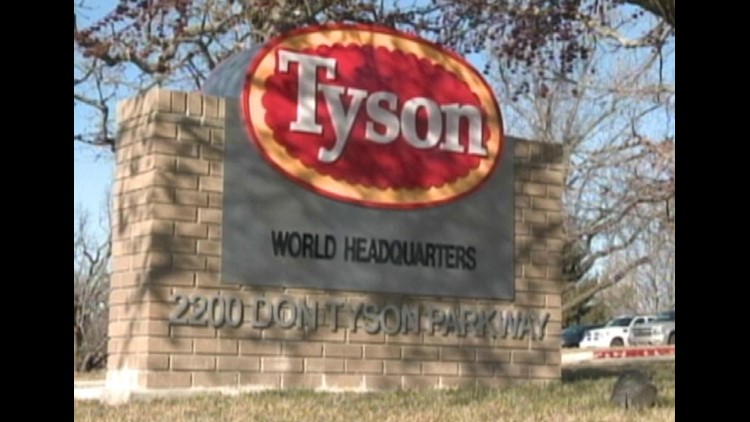Tyson Foods agreed to pay almost $4 million in fines in a settlement with the federal government over a series of accidental chemical releases at Tyson plants in four states, according to the U.S. Environmental Protection Agency.
A news release from the EPA states accidental releases of anhydrous ammonia at facilities in Kansas, Missouri, Iowa and Nebraska have caused multiple injuries, property damage and one death.
Springdale-based Tyson settled with the EPA and the U.S. Department of Justice, accepting the $3.95 million fine, along with an assurance to purchase $300,000 in emergency response equipment.
Anhydrous ammonia is a poisonous gas that can cause temporary blindness and eye damage, as well as irritation of the skin, mouth, throat, respiratory tract and mucous membranes. Extensive exposure to the gas can cause severe lung damage or death, according to the EPA.
Tyson released a statement Friday, saying:
“Springdale, Arkansas – April 5, 2013 – Tyson Foods, Inc. has worked cooperatively with the U.S. Environmental Protection Agency (EPA) to resolve concerns over the maintenance of refrigeration systems at food production plants in four states, the company reported today.
The agreement resolves the EPA concerns through the payment of a civil penalty and creation of a special program for meeting Risk Management Plan (RMP) requirements of the federal Clean Air Act at 23 Tyson Foods facilities in Iowa, Kansas, Missouri and Nebraska.
The new program will build upon Tyson Foods’ existing Risk Management Plans for the company’s refrigeration systems, which use anhydrous ammonia as a refrigerant. The plans are designed to prevent chemical emergencies by requiring a systematic process for managing chemical hazards, including training, worker communication, maintenance and other activities.
EPA asserted the company had not complied quickly enough with several RMP requirements at some facilities located within EPA Region 7 (Midwest). Company officials dispute many of the EPA’s assertions, but acknowledge there was a period when some refrigeration improvement projects fell behind schedule and Tyson did not meet all the obligations required under the program at several locations.
“We strive to operate our facilities responsibly, so after learning of EPA’s concerns we immediately made improvements and cooperated with EPA officials throughout the process,” said Kevin Igli, senior vice president and chief Environmental, Health and Safety Officer of Tyson Foods.
“We also agreed to develop a third-party audit system at the facilities involved to assure EPA these plants are in compliance with all aspects of our Risk Management Plan obligations,” Igli said. “In fact, we expect this auditing system to become a model provision that EPA may require from other industrial users of anhydrous ammonia or other chemicals, including other agricultural and food companies.”
In addition to the audits, Tyson Foods has agreed to pay a civil penalty of $3.95 million. The company will also provide $300,000 to help purchase emergency response equipment for fire departments in nine communities where it operates plants. Tyson Foods and EPA officials chose the communities and contacted fire department officials in each city to determine their equipment needs. The communities include: Council Bluffs, Iowa (two facilities); Dexter, Missouri; Monett, Missouri; Omaha, Nebraska; Noel, Missouri; Perry, Iowa; Lexington, Nebraska; and Dakota City, Nebraska.
The other plant locations covered in the agreement with EPA include: Cherokee, Iowa; Columbus Junction, Iowa; Denison, Iowa; Sioux City, Iowa; Emporia, Kansas; South Hutchinson, Kansas; Hutchinson, Kansas; Sedalia, Missouri; Madison, Nebraska; Concordia, Missouri; Finney County, Kansas; Montgomery City, Missouri; Olathe, Kansas; Storm Lake, Iowa; and Waterloo Iowa (two facilities).
Tyson Foods, Inc., founded in 1935 with headquarters in Springdale, Arkansas, is one of the world’s largest processors and marketers of chicken, beef and pork, the second-largest food production company in the Fortune 500 and a member of the S&P 500. The company produces a wide variety of protein-based and prepared food products and is the recognized market leader in the retail and foodservice markets it serves. Tyson provides products and services to customers throughout the United States and approximately 130 countries. The company has approximately 115,000 Team Members employed at more than 400 facilities and offices in the United States and around the world. Through its Core Values, Code of Conduct and Team Member Bill of Rights, Tyson strives to operate with integrity and trust and is committed to creating value for its shareholders, customers and Team Members. The company also strives to be faith-friendly, provide a safe work environment and serve as stewards of the animals, land and environment entrusted to it.”



